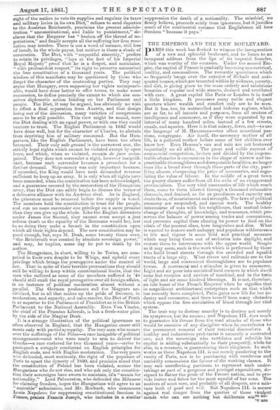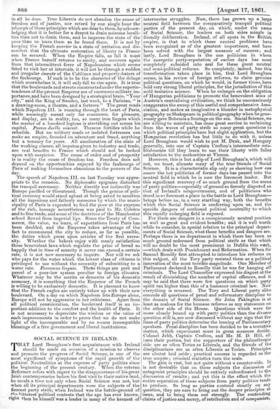THE EMPEROR AND THE NEW BOULEVARD.
PARIS this week has flocked to witness the inauguration of a new and splendid boulevard, and to listen to an inaugural address from the lips of its imperial founder, which was worthy of the occasion. Under the second Em- pire, the capital of France is gradually becoming symmetrical, healthy, and commodious. The romantic quaintness which so frequently hangs over the exterior of ill-built and anti- quated houses, which are tenanted within by sickness, poverty, and diit, is giving place to the more orderly and salubrious beauties of regular and wide streets, drained and ventilated with care. A great capital like Paris or London is in itself a little kingdom. It possesses many noble and elegant quarters where wealth and comfort only are to be seen. But it has, too; its untravelled and hideous regions, which are as far, to all intents and purposes, from all centres of intelligence and commerce, as if they were separated by an interval of many hundred miles, instead of a few streets, canals, and squares. Here it is that misery, fever, and—to use the language of M. Haussman—too often anarchical'pas- sions, congregate. Air itself, the necessary mother of all life, is a polluted mother before some of her children ever know her. Even Heaven's sun and rain are not bestowed impartially on all alike. The great and noble current of commercial competition, broken and divided by the impene- trable obstacles it encounters in the shape of narrow and im- practicable thoroughfares and disreputable localities, no longer runs like a broad river through these parts of the city, puri- fying abuses, cheapening the price of necessaries, and regu- lating the value of labour. In the middle of a great town the poorer classes suffer from all the evils of an exaggerated provincialism. The very vital necessaries of life which reach them, come to them filtered through a thousand exhaustive channels, and drained, so far as greediness and rapacity can drain them, of nourishment and strength. The laws of political economy are suspended, and cannot work. The healthy intercourse of man with his neighbours, that mutual inter- change of thoughts, of knowledge, and resources, which pre- serves the balance of power among trades and occupations, and prevents capital from abusing its power to feed on the vitals of the poorest class, here languishes and dies. What is wanted to restore such unhappy and populous wildernesses to life and vigour is some bold and practical measure which may bring them out of seclusion into daylight, and restore them to intercourse with the upper world. Simple as it may seem, such is the work which is performed by those who build broad streets through the crowded and squalid tracts of a large city. What rivers and railroads are to the world, large and convenient thoroughfares are to populous towns. A movement and a stimulus is given to commerce. Light and air pour into unvisited local corners in which dwell none but enemies and enviers of mankind, and in the train of light and air come kindred blessings. It is not, therefore, an idle boast of the French Emperor when he signifies that in magnificent architectural enterprises such as that which has recently been completed, Paris gains new life for her in- dustry and commerce, and frees herself from many obstacles which oppose the free circulation of blood through her vital system. The true way to destroy anarchy is to destroy not merely its symptoms, but its causes ; and Napoleon III. does much to guarantee his throne from the mad attacks of those who would be enemies of any discipline when he contributes to the permanent removal of their material discomforts. A. healthy and industrious proletariat is naturally a contented one, and the sovereign who ventilates and rebuilds his capital is adding substantially to their prosperiq, while die also, in a measure, is guaranteeing their allegiance. In such works as these Napoleon III. is not merely pandering to the vanity of Paris, nor is he purchasing with cumbrous and unthrifty concessions the favour of the working classes. It may suit unreflecting partisans to represent such under- takings as part of a gorgeous and prodigal expenditure, de- signed to flatter the pride Of the French nation, and to pro- vide loaves and fishes for the most squalid of her sons. The motives of most men, and probably of all despots, are a mix- ture both of good and evil. But Napoleon III. is secure against real danger from the quarter of those virulprit minds who can see nothing but deliberate wic" ac-
. y are
in all he does. True Liberals do not abandon the cause of freedom and of justice, nor retard by one single hour the triumph of those principles which are dear to them, byacknow- 'edging that it is better for a despot to drain noisome locali- ties than not to drain them, and to improve the state of the poor than to leave them as he found them. It is not by keeping the French ouvrier in a state of irritation and dis- comfort that the ultimate restoration of liberty to France can be secured. When the Empire falls, as fall it must when France herself returns to sanity, and recovers again from that intermittent fever of Napoleonism which seems fated to visit her at intervals, it will not be through a sudden and irregular imeute of the Catilines and property-haters of the faubourgs. If such is to be the character of the deluge which overwhelms it, it will only fall to rise again. It is true that the boulevards and streets constructedunder the superin- tendence of the present Emperor are of enormous military im- portance, and have been designed by a strategical brain. "Your city," said the King of Sweden, last week, to a Parisian, " is a drawing-room, a theatre, and a fortress." The great roads which Napoleon III. is 'running through the heart of Paris, while seemingly meant only for commerce, for pleasure, and display, are in reality, too, so many iron fingers which the master of a hundred legions is stretching out across his capital. Paean duello miscuit. Theseus fortifies while he rebuilds. But no military roads or isolated fortresses can make an empire, founded on adventure and fraud, anything but a tenancy for years. All amelioration of the state of the working classes, all impetus given to industry and trade, are real benefits to France which should not be looked upon with suspicion. The cause of order and of prosperity is in reality the cause of freedom too. Freedom does not depend on the opportunities enjoyed by the faubourgs of Paris of making themselves obnoxious to the powers of the day.
The speech of Napoleon III. on last Tuesday was appro- priate to the occasion. No diplomatic epigrams disturbed the tranquil ceremony. Neither directly nor indirectly was Europe pacified or threatened. Though the genius of poli- tical economy would stand aghast at being asked to sanction all the ingenious and fatherly measures by which the muni- cipality of Paris is expected to feed the poor at the expense of the rich, homage nevertheless was paid to Mr. Cobden and to free trade, and some of the doctrines of the Manchester school flowed from imperial lips. Since the Treaty of Com- merce, the value, we learn, of exportations from Paris has been doubled, and the Emperor takes advantage of the fact to recommend the city to reduce, as far as possible, the duties which press upon articles of the first neces- sity. Whether the bakers enjoy with manly satisfaction those benevolent laws which regulate the price of bread so happily that in time of scarcity it never can exceed a certain rate, it is not now necessary to inquire. Nor will we ask who pays for the water which the lowest class of citizens is privileged to use without the necessity of submitting to a water rate. Favearaus linguis. These things are part and parcel of a poor-law system peculiar to foreign climates. Whatever may be the merits or demerits of his domestic economy, it is something that the Emperor of the French is willing to be exclusively domestic. It is pleasant to know that the French eagles are entirely taken up with their new boulevard. On a day on which Napoleon lets Europe alone, Europe will not be aggressive in her criticisms. Apart from all political consideration, the boulevard itself is an im- portant addition to the comfort and the health of Paris. It is not necessary to depreciate the wisdom or the value of such improvements in order to prove that we do not make light of the incomparable and by no means incompatible blessings of a free government and liberal institutions.































 Previous page
Previous page